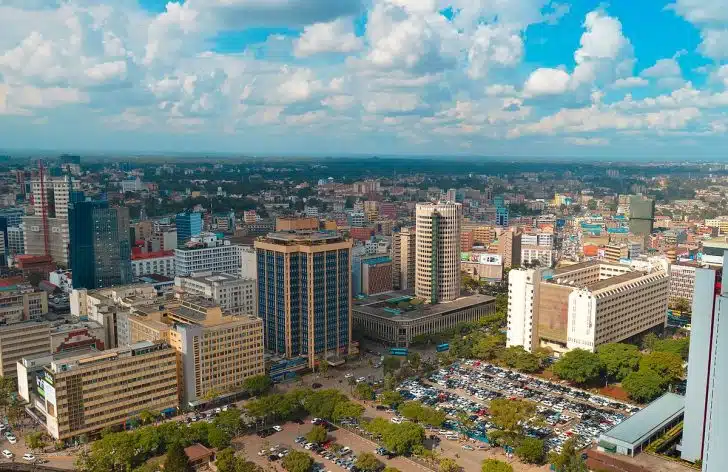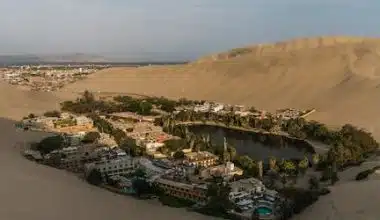Is it safe to travel to Kenya? Kenya’s fantastic safari areas are safe to visit for solo female travelers and tourists, and its kind, welcoming people will make your journey unforgettable.
Kenya is a unique and attractive country with numerous safe tourist attractions. Some of the safest places to visit are Nairobi, Mombasa, Maasai Mara National Reserve, Amboseli National Park, Tsavo National Park, and Lake Naivasha. Travelers should, however, be wary of potential hazards such as crime, terrorism, civil instability, and health difficulties. Tourists can enjoy diverse natural beauty, rich wildlife, cultural experiences, adventure tourism, stunning beaches, economic benefits, conservation activities, and cultural exchange in Kenya.
Is Kenya Safe?
This is the question on the minds of all travelers, tourists, and visitors who want to visit this rich East African location. Kenya has many attractions, but visitors must be mindful of potential dangers. High crime and terrorist levels, as well as specific places such as Nairobi, Naivasha, Nanyuki, Meru, Narok, and coastal areas, represent a considerable threat. Travelers should be aware of local travel warnings and use caution in rural locations, specific Nairobi neighborhoods, and areas bordering Somalia.
Here are some things to think about when it comes to Kenya’s safety:
#1. Crime
Kenya has a high crime rate, which includes armed carjacking, mugging, home invasions, and kidnapping. situations can happen at any time, and local law enforcement may be unable to respond efficiently to significant criminal situations. Due to crime, travelers are recommended to remain extremely cautious after dark.
#2. Terrorism
Terrorism is a credible concern in Kenya, with foreigners being prospective targets in select regions such as Nairobi, Naivasha, Nanyuki, Meru, Narok, and the coast. Terrorists have attacked government buildings, tourist attractions, transit hubs, hotels, resorts, markets, shopping malls, and places of worship. Terrorist attacks are more likely in some places, such as the Kenya-Somalia border counties and some coastal districts.
#3. Remote Areas
While distant portions of Kenya may have lower crime rates than big towns, visitors should remain attentive and up-to-date on the local situation. When traveling to distant places, it is critical to take measures and seek assistance from local authorities or tour companies.
#4. Specific Areas
Certain Nairobi neighborhoods, like Eastleigh and Kibera, have higher crime rates, and travelers are urged to avoid visiting these areas unless necessary. Furthermore, due to the possibility of kidnapping, terrorism, and cross-border violence, some counties bordering Somalia, as well as locations in northern and western Kenya, have specific travel recommendations.
#5. Civil Unrest
Civil disturbance is possible in Kenya; thus, it is critical to be updated about the current situation and to heed the advice of local authorities and travel advisories.
#6. Health Issues
While most food in Kenya is safe to consume, visitors should be wary of ice in drinks, cleaned salads, and fruits and should inquire about the source of water. It is also advised to avoid warmed food or food that has been sitting out for a while. Tick bite fever and Rift Valley fever are two further health dangers in Kenya. Travelers are encouraged to be cautious and protect themselves from insect bites.
#7. Travel Advisory
The United States Department of State has issued a travel alert for Kenya, advising visitors to exercise extreme caution due to crime, terrorism, civil upheaval, and kidnapping. It is suggested that you read the complete travel advisory to stay up-to-date on the current situation.
#8. Transportation
In Kenya, public transportation, including interstate buses, local minibusses (matatus), and motorbike taxis (boda-bodas), may pose safety risks. These modes of transportation are often badly maintained, driven carelessly, and underinsured. There have been reports of hijackings and robberies. It is best to select reputable taxi companies and confirm the fare ahead of time.
#9. Identification and Security Measures
It is best to keep a form of identification on you at all times, with a copy of your passport usually sufficing. Some police officers, however, may demand the original. Travelers are advised to be cautious of thieves impersonating police officials or private security guards and to always request identification. It is also advised to avoid accepting food or drink from strangers, as it may contain drugs.
#10. Local Assistance
The Kenya Tourism Federation has a 24-hour Safety and Communication Center that provides information on tourism and road conditions, as well as regional support in the event of an emergency. This can be an extremely useful resource for travelers.
Is Kenya Safe to Visit?
Kenya has a moderate level of crime, a terrorism concern in specific locations, potential civil instability, and health considerations that travelers should be aware of. Despite these reservations, Kenya is a lovely nation with interesting sights and kind people.
Safe Places to Visit in Kenya
Kenya is a diverse and beautiful country with many safe spots to visit. Some of the safe places to visit in Kenya are:
#1. Nairobi
Nairobi, despite being the capital city, has improved its security in recent years. It has a vibrant cultural scene, wildlife conservation centers, and surrounding national parks. However, it is critical to take caution and be aware of your surroundings, especially in areas like Eastleigh and Kibera.
#2. Mombasa
Mombasa, a prominent coastal city famed for its gorgeous beaches and historical buildings, is a popular tourist destination. The Madaraka Express, which connects Nairobi and Mombasa, is a dependable and safe railway route in the city. When going within the city, it is best to select reputable taxi companies and confirm the fare ahead of time.
#3. Maasai Mara National Reserve
The Maasai Mara is one of Africa’s most well-known wildlife reserves. It provides excellent animal viewing possibilities, particularly during the yearly wildebeest migration. The reserve is well-managed, and there is a significant security presence to assure visitors’ safety.
#4. Amboseli National Park
Amboseli National Park is famous for its spectacular vistas of Mount Kilimanjaro as well as its vast elephant herds. It is a safe place for wildlife aficionados and provides a variety of guest accommodations.
#5. Tsavo National Park
Tsavo National Park is one of Kenya’s largest national parks, separated into Tsavo East and Tsavo West. It is home to a variety of species, including elephants, lions, and giraffes. The park’s infrastructure is well-established, and visitors are deemed safe.
#6. Naivasha
Lake Naivasha is a freshwater lake in the Great Rift Valley in Kenya. It has lovely views, bird-watching opportunities, and boat safaris. Naivasha is generally regarded as safe for tourists; however, precautions and local standards should be followed.
#7. Diani Beach
On Kenya’s coast, Diani Beach is a renowned tourist destination. It is famous for its white-sand beaches and crystal-clear waters. The region has a high level of protection and is deemed safe for travelers.
#8. Nakuru
Nakuru is a Kenyan city in the Rift Valley region. Lake Nakuru National Park, which is home to a high population of flamingos and other bird species, is well-known. The national park is well-kept and provides wildlife drives, bird watching, and picturesque views.
#9. Lamu Island
Lamu Island is a UNESCO World Heritage Site on Kenya’s northern coast. It is well-known for its vibrant Swahili culture, historical buildings, and stunning beaches. The island has a laid-back vibe and is regarded as safe for visitors.
#10. Mount Kenya
Mount Kenya is Kenya’s highest peak and Africa’s second-highest. It has beautiful scenery, diverse fauna, and thrilling trekking options. The mountain features well-established hiking trails and skilled guides to ensure guest safety.
Is Kenya Safe for Tourists?
Kenya is a popular tourist destination because of its unique animals and lively culture, but there are some safety precautions that visitors should take. Before traveling to Kenya, travelers should be aware of the risks and keep up to date on current events. Crime, particularly armed carjacking and mugging, is a worry, so use caution, especially at night. Tourists can have a safe and pleasurable trip in Kenya if they stay informed, take care, and follow local recommendations.
The Advantages of Visiting Kenya as a Tourist
Kenya provides numerous benefits to tourists, making it a popular destination for visitors from all over the world. Here are some of the advantages that Kenya has to offer.
#1. Natural Beauty in a Variety of Forms
Kenya is famous for its breathtaking landscapes, which include the landmark Maasai Mara National Reserve, Mount Kenya, and the Great Rift Valley. These natural treasures offer stunning views as well as possibilities for animal safaris, birdwatching, and other outdoor activities.
#2. Abundant Wildlife
Kenya is home to a wide range of species. Visitors to the Maasai Mara can see the annual wildebeest migration, go on game drives, and have up-close interactions with spectacular animals in their native habitats.
#3. Cultural Encounters
Kenya is a cultural melting pot, having over 40 ethnic groups. Visitors can immerse themselves in the vivid Maasai, Samburu, Kikuyu, and other cultures’ customs, music, dancing, and cuisine. Cultural tourism provides an exceptional opportunity to learn about Kenya’s rich past while also interacting with local populations.
#4. Adventure Tourism
Kenya has a variety of adventure activities for adrenaline seekers. There are numerous chances for adrenaline-pumping excursions, ranging from hot-air balloon safaris and camel treks to mountain climbing, white-water rafting, and snorkeling in the Indian Ocean.
#5. Beaches and Marine Life
Kenya’s Indian Ocean coastline is lined with lovely beaches such as Diani Beach and Watamu. Visitors can unwind on immaculate white sands, participate in water activities like snorkeling and diving, and discover vibrant coral reefs alive with marine life.
#6. Economic Advantages
Tourism contributes significantly to Kenya’s economy. It aids in the production of jobs, the earning of foreign currency, and the development of local communities. Tourism stimulates economic growth by supporting diverse industries such as hospitality, transportation, and handicrafts.
#7. Conservation Efforts
Kenyan tourism has contributed to the funding of conservation programs and wildlife protection. Revenue from park fees and wildlife tourism helps to preserve national parks and reserves, preserving the long-term viability of Kenya’s natural heritage.
#8. Cultural Understanding and Exchange
Tourism encourages cultural interchange and understanding among visitors and residents. It allows people of all origins to learn from one another, promoting mutual respect and understanding for varied cultures.
#9. Birdwatching Paradise
Kenya is a birdwatcher’s paradise, with over 1,000 bird species documented. The country’s diversified environments, which include lakes, forests, savannas, and marshes, attract a broad range of migratory and resident birds. Bird enthusiasts can see flamingos, pelicans, eagles, and ostriches in their natural habitats.
#10. Rich Archaeological Sites
Kenya has a rich archaeological heritage, with places such as the Koobi Fora Museum and the Great Rift Valley revealing information about human evolution and past civilizations. Visitors interested in anthropology and history can learn about Kenya’s prehistoric past by visiting these locations.
Is Kenya Safe for Solo Female Travelers?
Kenya is generally regarded as secure for solitary female visitors; however, certain care should be taken to ensure a safe and pleasurable vacation. While Kenya is typically secure for female solo travelers, it is always prudent to take caution and adhere to common-sense safety precautions. You can have a safe and happy experience enjoying the beauty of Kenya by being aware of your surroundings, taking appropriate precautions, and relying on trusted travel agencies.
Tips for Female Solo Travelers in Kenya
Traveling alone as a girl in Kenya can be a safe and fulfilling experience if certain precautions are taken. These precautions include the following:
#1. Conduct Research and Make a Plan
Prepare for your trip by researching your destination and learning about local customs, traditions, and any potential safety risks. Learn about the regions you intend to visit and be aware of any travel advisories or warnings.
#2. Dress Modestly
Kenya is a conservative country; therefore, dress modestly, particularly in rural areas and when visiting religious places. Clothing that covers your shoulders and knees can help you blend in and respect local norms.
#3. Use Reliable Transportation
When traveling, choose dependable modes of transportation such as licensed taxis or reputed ride-hailing services such as Uber. Do not hitchhike or accept rides from strangers.
#4. Stay in Safe Accommodations
Choose hotels that are well-reviewed, strategically located, and provide adequate security. Consider staying in trustworthy hotels, guesthouses, or lodges with a good reputation among prior guests.
Inform a trusted person about your vacation plans, including your itinerary, lodging arrangements, and contact information. Check-in with them regularly and notify them of any changes to your plans.
#6. Avoid walking alone late at night.
It is best to avoid wandering alone at night, especially if the area is new or poorly lit. If you need to go out after dark, consider taking a cab or other reliable mode of transportation.
#7. Be Conscious of Your Possessions
Always keep your valuables, such as passports, money, and electronics, secure. Carry your critical documents and cash in a money belt or a disguised bag. Keep an eye on your surroundings and avoid exhibiting pricey objects that may draw unwanted attention.
#8. Trust Your Instincts
Trust your intuition and be wary of strangers who appear unusually pleasant or aggressive. If you feel uncomfortable or unsafe in any situation, leave it and seek help from trusted authorities or locals.
9. Network with Other Travelers
Connect with other lone female travelers if possible, or join group excursions or safaris. Traveling with people can provide comfort and company.
#10. Stay Informed
During your time in Kenya, keep up with local news and activities. Follow trustworthy information sources and be informed of any potential safety threats or changes in the security situation.
Are Tourists Safe in Kenya?
Kenya is typically safe for tourists, but it is critical to be aware of potential hazards and take the required precautions. Violent crimes can occur, especially in select neighborhoods, such as Mombasa’s Old Town. It is best to avoid wandering alone at night and to use dependable transportation. Bandits are a problem in several border locations. Tourists are rarely targeted in game reserves, but it is still critical to heed safari guides’ recommendations. Female lone travelers can feel safe in general, but they should take conventional safety precautions. Certain areas of Nairobi and Mombasa have higher crime rates.
Is Kenya a Safe Country to Live in?
Kenya, like any other country, has its own set of safety concerns. Armed carjacking, mugging, home invasion, and kidnapping can happen at any time in Kenya. Rising unemployment, high crime rates, and irregular utility service can make life in Kenya difficult. Precautions should be taken, such as not going alone at night, using dependable transportation, and remaining educated about local safety conditions. While there are concerns, Kenya also has a low cost of living, a diverse population, and expat-friendly cities. Individual priorities and comfort levels with the local environment ultimately determine whether or not to live in Kenya.
Is Kenya High-Risk?
The US Department of State advises against traveling to Kenya due to certain high-risk factors, such as crime, terrorism, civil unrest, and kidnapping. In the past, there have been outbreaks of diseases like yellow fever and Ebola, which have led to the idea of high risk. However, risk levels throughout the country can vary depending on individual places and conditions.
Is Kenya safer than South Africa?
Kenyan and South African safety comparisons are subjective and might vary depending on a variety of factors. South Africa, on the other hand, is widely regarded as safer than Kenya. In comparison to Kenya, South Africa has better-developed urban centers and a lower level of insecurity. However, both countries have their own safety concerns, and risk levels can vary between areas and cities. When living or traveling in either nation, it is best to stay up-to-date on the newest travel advisories, take the required precautions, and exercise prudence.
Is Kenya a Rich or Poor Country?
Kenya is seen as a country with severe poverty and income disparity. While the number of millionaires in Kenya is increasing, the majority of the population lives in poverty. The country has high inequality, with a small percentage of the people owning 80% of the wealth. Kenya is also confronted with issues such as tax evasion, a large number of out-of-school children, and a drop in education spending. According to the Global Multidimensional Poverty Index, about 40% of Kenyans are MPI-poor, showing the severity of poverty in the country. Furthermore, there is a vast disparity between the rich and the poor in Kenya.
What are the Disadvantages of Living in Kenya?
Living in Kenya has several drawbacks. These include rapid population expansion, income disparity and poverty, high utility costs, security problems, healthcare challenges, infrastructural restrictions, and educational system issues.
Summary
Kenya, as a tourism destination, offers a wide range of activities and is generally friendly. However, caution should be exercised, particularly in crowded marketplaces and urban areas, against petty crimes such as pickpocketing. It is usually best to avoid walking alone at night, to use only licensed taxis, and to avoid remote regions. Furthermore, because of the infrequent occurrences of political turmoil and terrorism, staying informed about local news will make you more vigilant and safe.
- KENYA SAFARI TOURS: Best Operators & Packages
- CHRISTMAS IN AFRICA: A Symphony of Cultures, Traditions, and Joy
- IS IT SAFE TO TRAVEL? All You Need To Know






